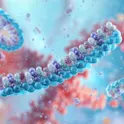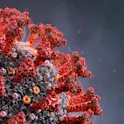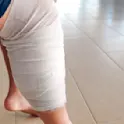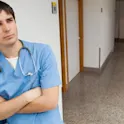
Health
30 Oct 2025
Scientists on ‘urgent’ quest to explain consciousness as AI gathers pace
As AI—and the ethical debate surrounding it—accelerates, scientists argue that understanding consciousness is now more urgent than ever.

Health
30 Oct 2025
As AI—and the ethical debate surrounding it—accelerates, scientists argue that understanding consciousness is now more urgent than ever.

Health
07 Oct 2025
Reducing industrial animal use can help to shrink our carbon footprint and boost health—but doing so means we need nutritious meat alternatives that are also tasty and affordable.

Featured news
14 Feb 2025
Researchers from Spain sampled sink drains from different wards in a single modern university hospital where state-of-the-art cleaning protocols are adhered to. Through culturing and DNA barcoding, they found 67 species of bacteria. These included Klebsiella, Enterobacter, and Pseudomonas aeruginosa, notorious for their potential to cause healthcare-associated infections. Several strains detected proved resistant to modern antibiotics, including cephalosporins and carbapenems. Sink drains thus appear to function as reservoirs for known and emerging pathogens of concern.

Featured news
15 Nov 2024
Researchers from the US looked for associations between the use of dating apps, sexual behavior, and a history of HIV/STIs among college students in North Texas. They showed that there was an association between risky sexual behavior and the use of dating apps. They propose that the two may be mutually reinforcing.

Health
26 Jul 2024
Researchers from the US analyzed replies to the Health Information National Trends Survey and found that doctors are more trusted than scientists and especially government health agencies. The results revealed that perceived uncertainty in health recommendations, inherent in the scientific process, tends to confuse the public and undermine its trust in experts apart from doctors. This implies that doctors are best placed to communicate changes in recommendations, to ensure better health and restore trust in agencies.

Frontiers news
25 Jun 2024
The World Economic Forum, in association with Frontiers, new Top 10 Emerging Technologies of 2024, released today (25 June), shows that among technologies emerging globally, reconfigurable intelligent surfaces and High-Altitude Platform Systems have the potential to connect billions worldwide who currently have no internet access.

Frontiers news
23 May 2024
Digital medicine and medical AI pioneer Dr Eric Topol will address thousands of researchers and policy makers from around the world on June 12, highlighting the transformative potential of digital technologies on medicine and healthcare.

Publishing partnerships
22 Dec 2023
A Slovakian study into generational attitudes to smoking has shown that generation Z is still attracted to cigarettes, even though data indicates the habit is waning in popularity among that age group.

Young Minds
14 Dec 2023
Frontiers for Young Minds has published the first articles in a new collection in collaboration with CERN, one of the world’s largest centers for scientific research. The collection, entitled 'SPARK-ing big questions: what is the future of health technology?', addresses key questions on how ground-breaking health technologies and science can improve human health for future generations.

Health
31 May 2023
by Liad Hollender, Frontiers science writer Image: Prof Gerold Stucki Is there more to health than just the absence of disease? According to a team of researchers from Swiss Paraplegic Research and the University of Lucerne, the answer is a resounding ‘yes’. In an article published in Frontiers in Science, the researchers explain how ‘human functioning’ – a new assessment of health – could revolutionize healthcare, and even help advance the UN 2030 Sustainable Development Agenda. But what is human functioning and why is it such a powerful concept? To find out, Frontiers spoke with the team – Prof Jerome Bickenbach, Prof Sara Rubinelli, Cristiana Baffone, and Prof Gerold Stucki. How would you define human functioning? Gerold: Functioning is a concept developed by the World Health Organization (WHO), which constitutes a rethinking of health that goes beyond disability and disease. It encompasses people’s biological health as well as their ‘lived health’ – the activities they perform in their daily lives. What activities? Everything from eating and grooming, to working and socializing. This way of thinking is important because while it’s true that our biological health affects what we can do, features of our environment can either improve this capacity or […]

Featured news
31 May 2023
by Liad Hollender, Frontiers science writer Image: Shutterstock Researchers reveal how a new assessment of health called ‘human functioning’ could bridge health and well-being, with far reaching benefits to individuals and society as a whole. Publishing in Frontiers in Science, the authors chart a plan for implementing human functioning into health systems, by recognizing it as a major health indicator alongside mortality and morbidity and establishing a new scientific field called human functioning sciences. The term ‘well-being’ entered popular vocabulary during the Covid-19 pandemic soon after ‘lockdown’ and ‘quarantine’. We quickly discovered that without the ability to take walks, socialize, and work, our well-being suffered. Health was suddenly more than just the state of our bodies – it also depended on our ability to engage in activities that matter to us. Though this was a revelation to many, the World Health Organization (WHO) had already begun this rethinking of health. It created a new concept and assessment framework to capture the multi-dimensional nature of our everyday health experience, called ‘human functioning. “Despite its great promise, this new tool has not been implemented widely in healthcare and policy. Our team’s goal is to make it happen,” said Prof Gerold Stucki, a […]

Featured news
01 Dec 2021
By Conn Hastings, science writer Image: Corona Borealis Studio/Shutterstock.com A new study shows the long-term implications of severe Covid-19 infection, with such patients demonstrating significantly increased chances of death in the 12 months following the illness. The majority of deaths occurred for a wide variety of reasons, suggesting that severe infection damages overall health. The stark findings highlight the need to reduce the numbers of severe infections through vaccination. Can long Covid kill? Striking findings presented in a new study published to Frontiers in Medicine show that patients who survive severe Covid-19 have more than twice the risk of dying over the following year, compared with those who experience mild or moderate disease or remain uninfected. Unusually, the increased risk of dying was greater for patients who are under 65, and only 20% of the severe Covid-19 patients who died did so because of typical Covid complications, such as clotting disorders or respiratory failure. The study suggests that severe Covid-19 may significantly damage long-term health and highlights the importance of preventing severe disease through vaccination. ► Read original article► Download original article (pdf) Reality of long Covid Covid-19 can cause severe symptoms and death for vulnerable people, particularly older patients and […]

Featured news
25 Oct 2021
By Conn Hastings, Science writer A person’s leg wrapped in bandage (not the smart bandage from this research). Image: Nutnaree Saingwongwattana/Shutterstock.com Maintaining optimal moisture levels could be key in allowing chronic wounds to heal. However, clinicians currently have no way to check moisture levels without removing a bandage, potentially disrupting the healing process. A new study presents a smart bandage that can measure and wirelessly transmit wound moisture data in real time. The technology could be a useful tool in treating chronic wounds. How can doctors make sure a dressed wound is healing without taking off the bandage? This is a conundrum, because removing a bandage can disrupt the healing process. Technology presented in a new study in open-access journal Frontiers in Physics could help. This new ‘smart bandage’ contains a sensor that can very sensitively measure wound moisture levels and then transmit the data to a nearby smartphone, without requiring doctors to remove the bandage. In the future, by changing the geometry and materials in the bandage, the researchers may be able to fine tune it to suit different types of wounds. The technology could help doctors to monitor wounds more easily and successfully. Chronic wounds can be a […]

Featured news
16 Mar 2020
Four babies born in Wuhan, the epicenter of the novel coronavirus, did not show signs of infection: Frontiers in Pediatrics

Featured news
26 Sep 2018
The study also shows both men and women support increasing the gender balance in STEM more than in healthcare, early education and domestic (HEED) careers: Frontiers in Psychology
Get the latest research updates, subscribe to our newsletter